The Pirate of Basra
It is not often a 'Naval VC' comes up at auction, but the recent (March 2025) sale of the Victoria Cross awarded to Lieutenant Commander Charles Cowley brought to the public domain one of the less well known stories of a Victoria Cross award made during the Great War.
Charles Henry Cowley was born on 21 February 1879 in Baghdad, Mesopotamia (now Iraq) and was the eldest of ten children. His father, Henry Vereker Cowley, was the senior captain of the London-registered Euphrates and Tigris Steamship Navigation Company.
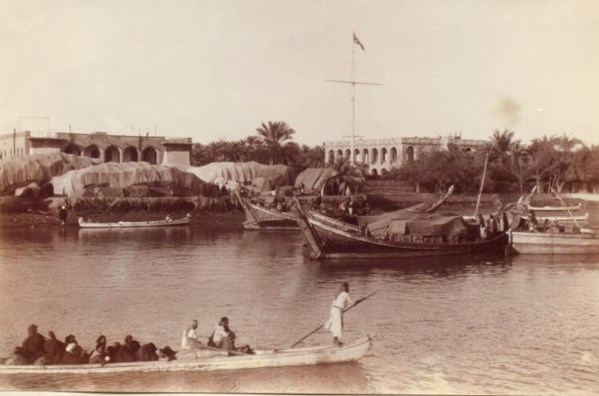
Sent back to the UK as a child, Charles was educated in Liverpool, and intending on a naval career, joined the training ship HMS Worcester as a cadet in January 1885. An seems to have been a good student as he gained a first class extra and ordinary certificate. In 1899, after the death of his father, 20-year-old Charles returned to Baghdad and joined the firm his father had worked for. In the following years he mastered Arabic and made many local friends, so was ideally suited as a river pilot, interpreter and intelligence agent for the British.
By 1914, he was the company’s senior captain. When war broke out between Britain and Turkey in November, he was directed by the owners of the company to take a steamer from Basra to Baghdad to help with the evacuation all British nationals who wished to leave.
Charles was in command of the steamer Mejiedieh initially had no military rank, but was later appointed as Lieutenant Commander in the RNVR. In coming months he played a vital role delivering troops and supplies to various points along the Tigris and Euphrates Rivers.
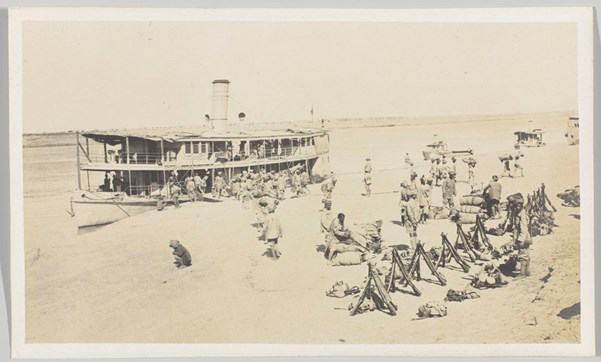
In December 1914 the Turks sentenced Charles to death in absentia at a military court hearing held in Baghdad and sent him a message declaring him to be a pirate. In defiance, Lt Cdr Cowley flew a skull and crossbones flag whenever he sailed to Basra.
It is possible the Turks considered Cowley a traitor because although his father was British, his mother was a Turkish Armenian citizen.
In 1915 an attempt was made on his life, when an assassin boarded the Mejiedieh and stabbed the ship's Captain who was sleeping in the bed normally slept in by Charles Cowley.
By April 1916 operations in Mesopotamia had bogged down and a large British/Indian force was besieged at Kut. In an attempt to resupply the trapped forces the Julnar (a pre-war 900-ton, 210-ft long river steamer which had been adopted into the Royal Navy so becoming HMS Julnar) was sent up the River Tigris in a bold attempt to resupply starving troops.
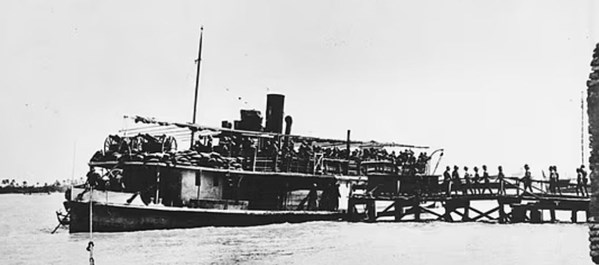
A map of area can be seen here > Mesopotamia
Commanded by Humphrey Firman (a 29 year old Royal Navy Lieutenant) who was assisted by the 44 year old Charles Cowley, the expedition was doomed from the start.
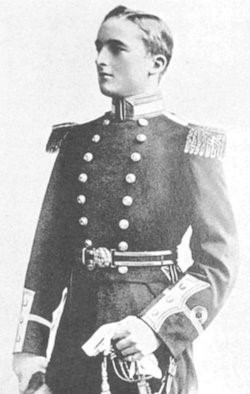
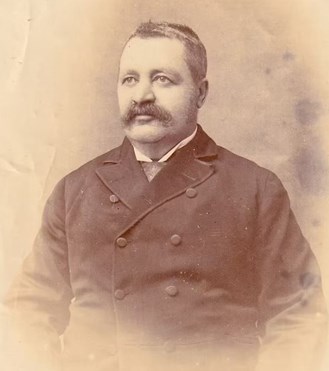
Loaded with a vital 270 tonnes of supplies Firman, Cowley plus Sub-Lieutenant Lewis Reed (the engineer) and a crew of 12 ratings set off from Falahiyah up the River Tigris.
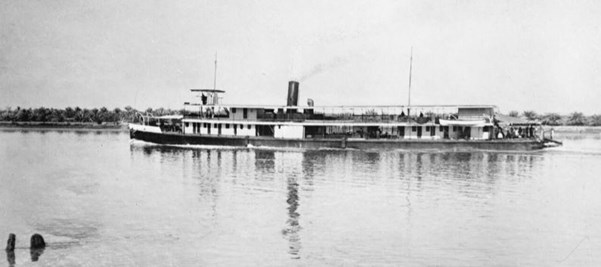
Unfortunately Julnar was attacked almost at once by Turkish machine-guns and artillery. At Magasis, steel hawsers stretched across the river halted the expedition, the Turks opened fire at point-blank range and Julnar’s bridge was smashed, killing the Firman and several crew members.
Lieutenant-Commander Cowley was taken prisoner with the other survivors.
The London Gazette sets out what was understood at the time:
At 1 a.m. on the 25th, [April 1916] Gen. Townshend reported that she had not arrived, and that at midnight a burst of heavy firing had been heard at Magasis, some 9 miles from Kut by river, which had suddenly ceased. There could be but little doubt that the enterprise had failed, and the next day the Air Service reported the "Julnar" in the hands of the Turks at Magasis. The leaders of this brave attempt, Lieut. H.O.B. Firman, R.N., and his assistant, Lieut. Comdr. C.H. Cowley, R.N.V.R. - the latter of whom throughout the campaign in Mesopotamia performed magnificent service in command of the "Mejidieh", - have been reported by the Turks to have been killed; the remainder of the gallant crew, including five wounded, are prisoners of war. Knowing well the chances against them, all the gallant officers and men who manned the 'Julnar' for the occasion were volunteers. I trust that the services in this connection of Lieut. H.O.B. Firman, R.N., and Lieut. Comdr. C.H. Cowley, R.N.V.R., his assistant, both of whom were unfortunately killed, may be recognised by the posthumous grant of some suitable honour.
Many sources state that Charles Cowley was executed by the Turks, but this is not necessarily the case.
The Official History of the campaign (written in 1924) stated the fate of Cowley was not certain. Enquires during and after the war suggest that he was wounded when captured by the Turks but was separated after capture from the other prisoners. The Turks state on the other hand that he was found dead when the Julmar surrendered. Others suggested he was shot while trying to escape. Rumours among local Arabs - with whom he was influential - suggest he was shot by his Turkish captors.
Cowley’s body was said to have been buried at Fallahiya near the scene of his execution, although no grave was ever located. Charles's mother was presented with his Victoria Cross by Rear Admiral Drury Wake, Senior Naval Officer, Persian Gulf, in Basra, on 25th August 1917.
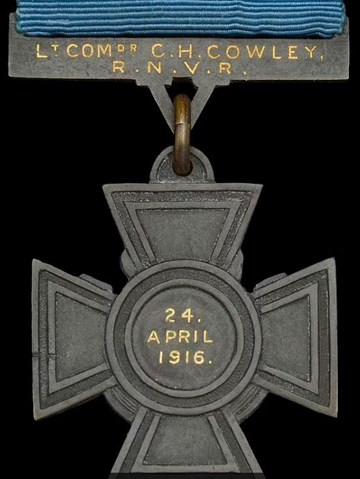
Investigations continued until 1920, but nobody was ever prosecuted for the murder of the “Pirate of Basra”.
Charles Cowley is commemorated on the Basra Memorial, as is Humphrey Firman who was also awarded the Victoria Cross. Sub-Lieutenant Lewis Reed survived the war. The names of the other crew members have not been recorded.
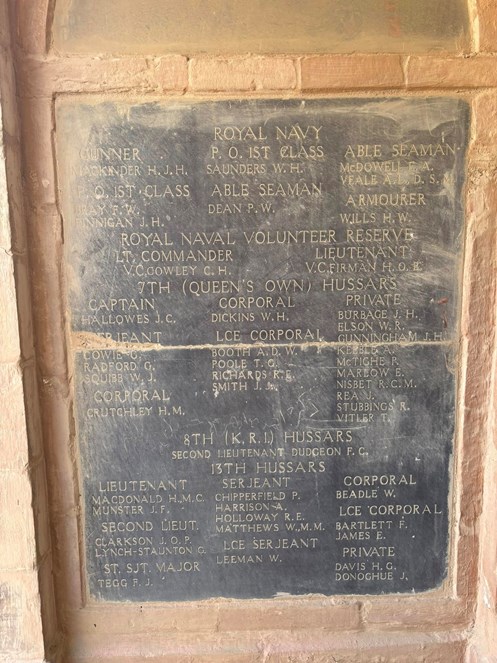
On 29th April 1916, General Townshend surrendered, with 13,259 officers, soldiers and non-combatants being taken prisoner, many of whom did not survive captivity. However British and Indian troops advanced the following year and took Baghdad in March 1917.
Further information about the siege at Kut can be seen on the WFA's YouTube channel here: Crisis at Kut by Alan Wakefield
Becoming a member of The Western Front Association (WFA) offers a wealth of resources and opportunities for those passionate about the history of the First World War. Here's just three of the benefits we offer:
This magazine provides updates on WW1 related news, WFA activities and events.
Access online tours of significant WWI sites, providing immense learning experience.
Listen to over 300 episodes of the "Mentioned in Dispatches" podcast.





